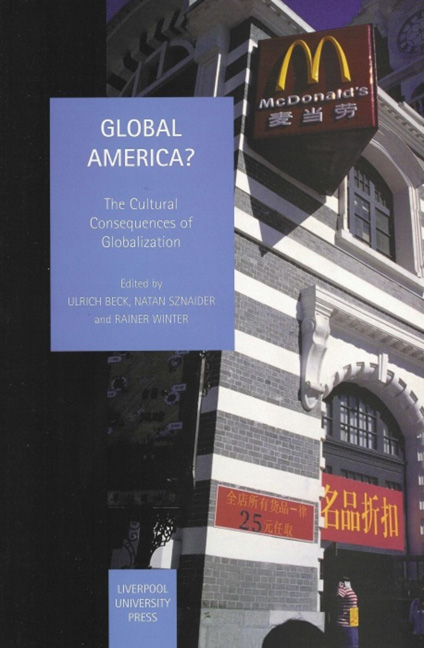Book contents
- Frontmatter
- Contents
- List of Contributors
- Acknowledgments
- Introduction
- PART I THEORETICAL PERSPECTIVES
- PART II NATIONAL CASE STUDIES
- 4 Hyperpower Exceptionalism: Globalization the American Way
- 5 Debating Americanization: The Case of France
- 6 Consumption, Modernity and Japanese Cultural Identity: The Limits of Americanization?
- 7 Americanization, Westernization, Sinification: Modernization or Globalization in China?
- PART III TRANSNATIONAL PROCESSES
- PART IV EPILOGUE
- Rethinking Americanization
4 - Hyperpower Exceptionalism: Globalization the American Way
from PART II - NATIONAL CASE STUDIES
- Frontmatter
- Contents
- List of Contributors
- Acknowledgments
- Introduction
- PART I THEORETICAL PERSPECTIVES
- PART II NATIONAL CASE STUDIES
- 4 Hyperpower Exceptionalism: Globalization the American Way
- 5 Debating Americanization: The Case of France
- 6 Consumption, Modernity and Japanese Cultural Identity: The Limits of Americanization?
- 7 Americanization, Westernization, Sinification: Modernization or Globalization in China?
- PART III TRANSNATIONAL PROCESSES
- PART IV EPILOGUE
- Rethinking Americanization
Summary
We are in a unique position because of our unique assets, because of the character of our people, the strength of our ideals, the might of our military and the enormous economy that supports it. (US Vice-President Dick Cheney addressing the Council on Foreign Relations, February 2002; in Gordon 2002)
Today's era is dominated by American power, American culture, the American dollar and the American navy. (Friedman 2000: xix)
In international affairs the USA displays growing unilateralism. International development policies have been constrained by the Washington consensus. The United States fails to sign on to major greening protocols. Until recently the USA was perennially in arrears in United Nations dues. On several occasions (such as Nicaragua and Panama) the USA has not followed international legal standards and it ignores the International Court if its verdict goes against it. American policies contribute to the enduring stalemate in the Middle East. Take any global problem and the United States is both the major player and major bottleneck. It is a reasonable question to ask whether this is just a matter of current US administrations or whether more profound dynamics are at work.
If we take seriously global problems and therefore also the need for global reform (such as the provision of global public goods and the regulation of international finance) and then turn to the question of political implementation we naturally arrive at the door of the United States. Progressive social forces and international institutions the world over make proposals for global reform, whose list is considerable and growing, but without US cooperation they stand little chance of being implemented. The world leader, then, turns out to be the global bottleneck and in this light American conditions and problems become world problems.
The thesis of ‘American exceptionalism’ in American social science holds that the USA is a special case. If we take this claim seriously, what does it imply for US leadership? What does it mean when a country that by its own account is the historical exception sets rules for the world? Let us revisit the arguments of American exceptionalism and then ask how this spills over into the international arena.
- Type
- Chapter
- Information
- Global America?The Cultural Consequences of Globalization, pp. 67 - 94Publisher: Liverpool University PressPrint publication year: 2003



